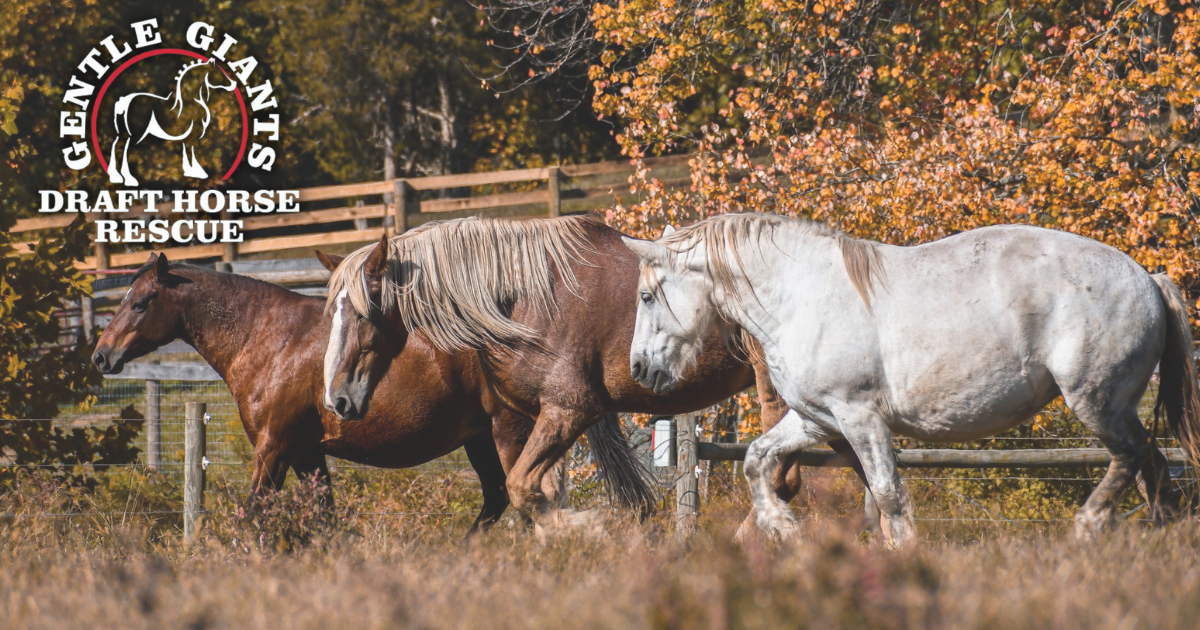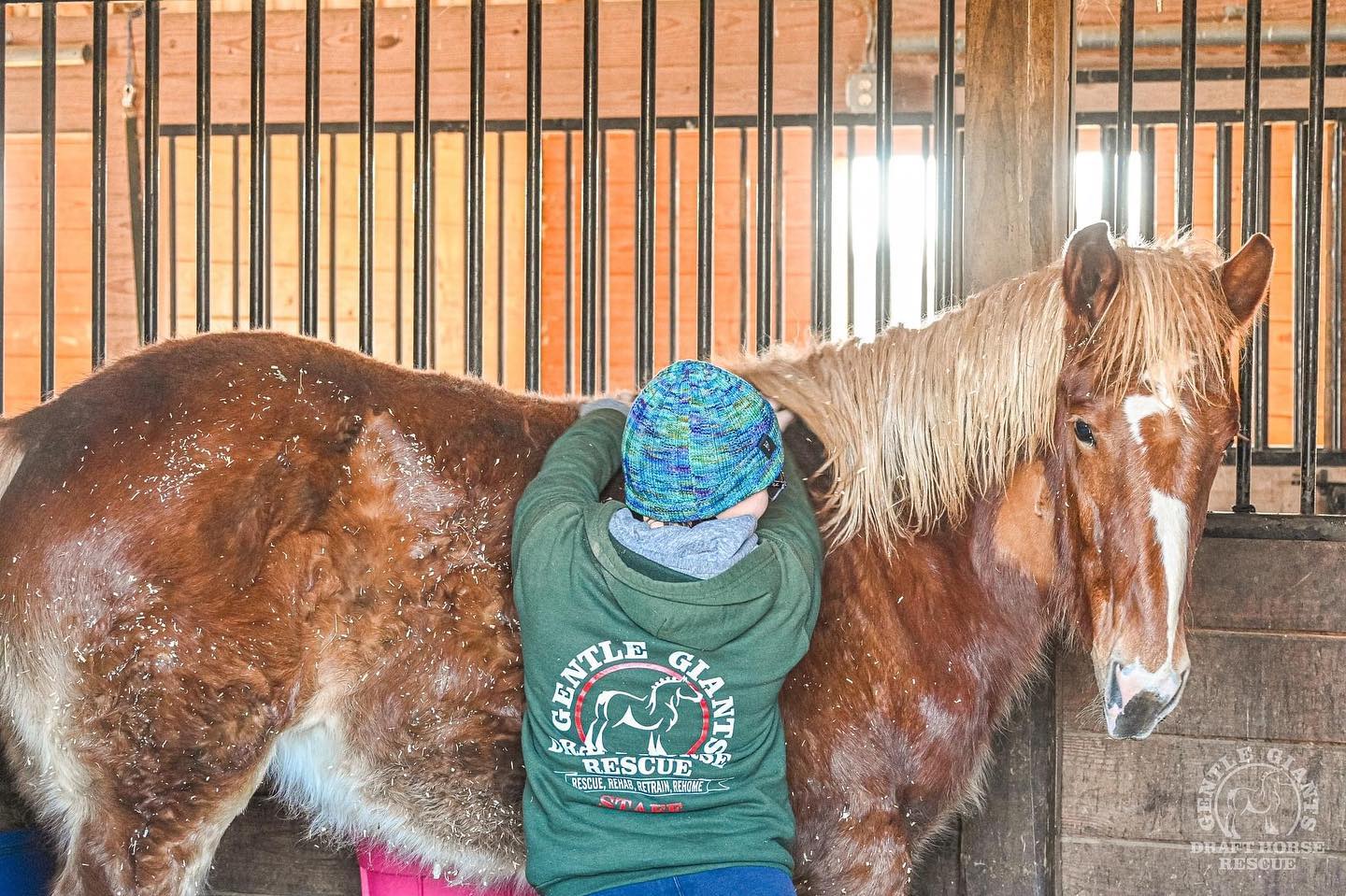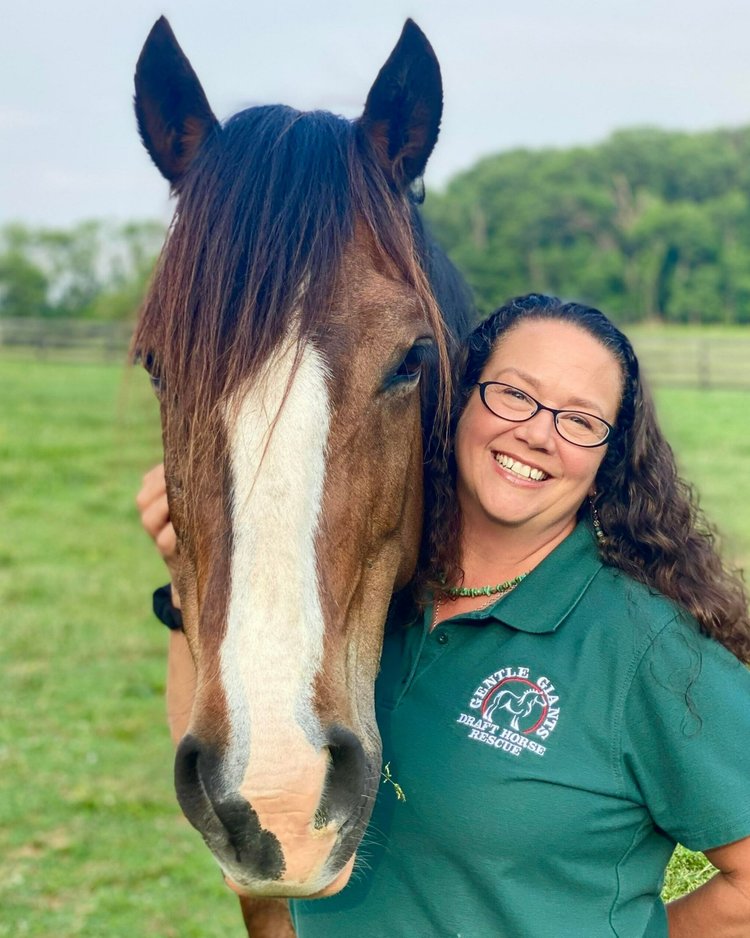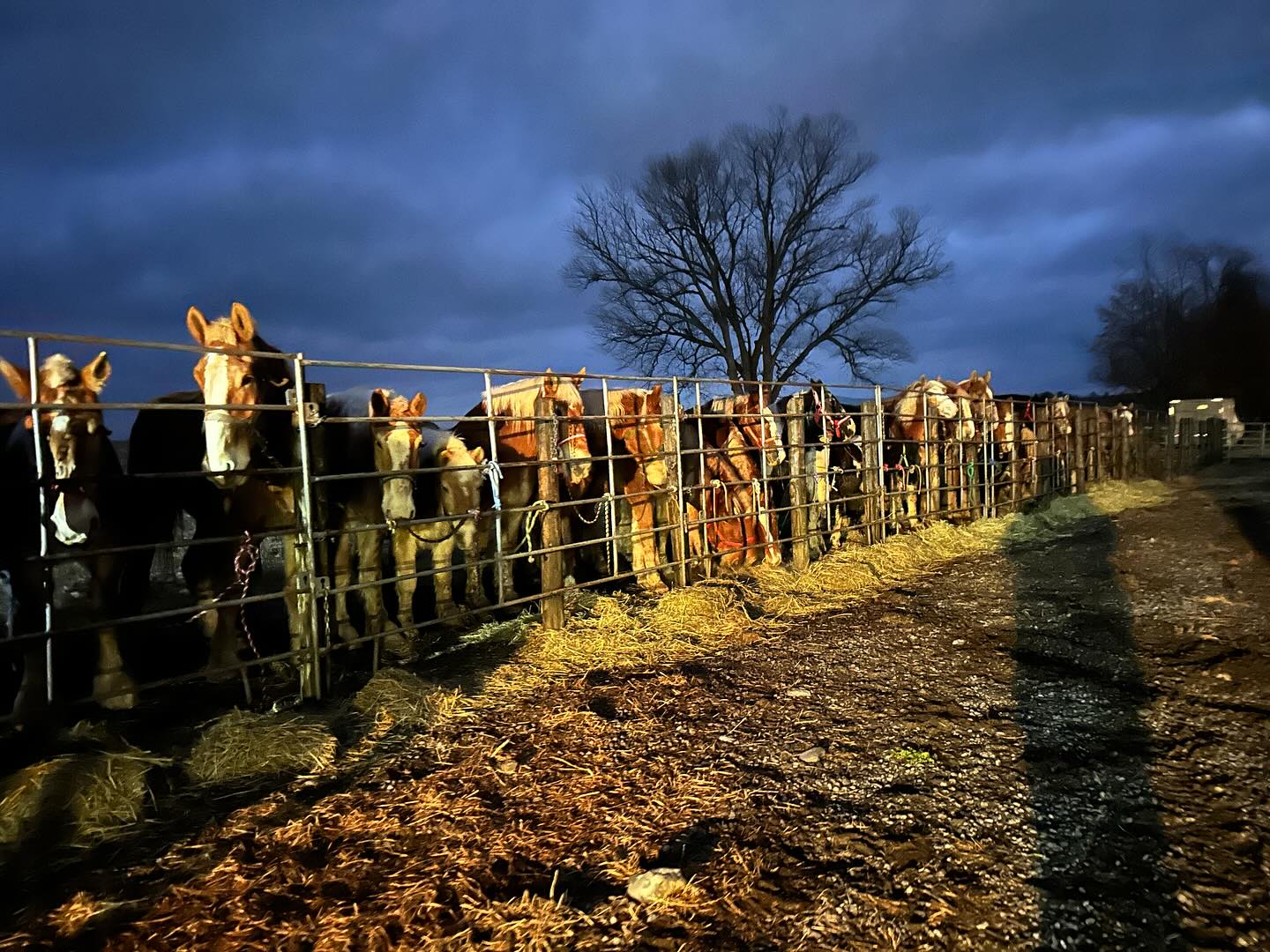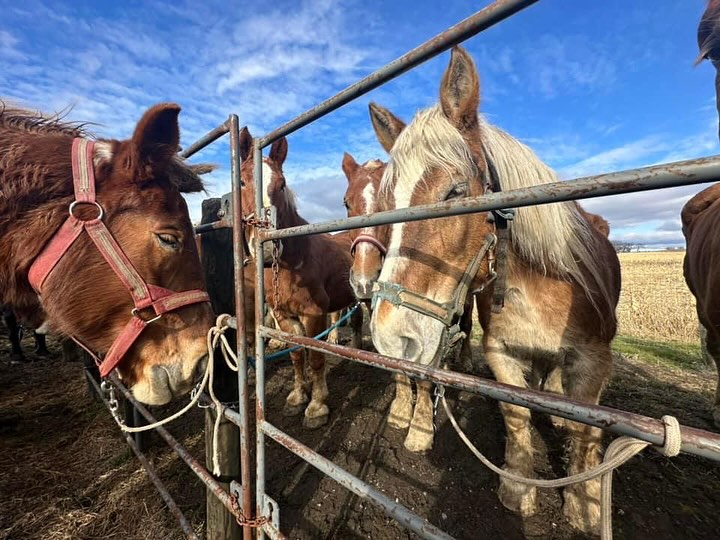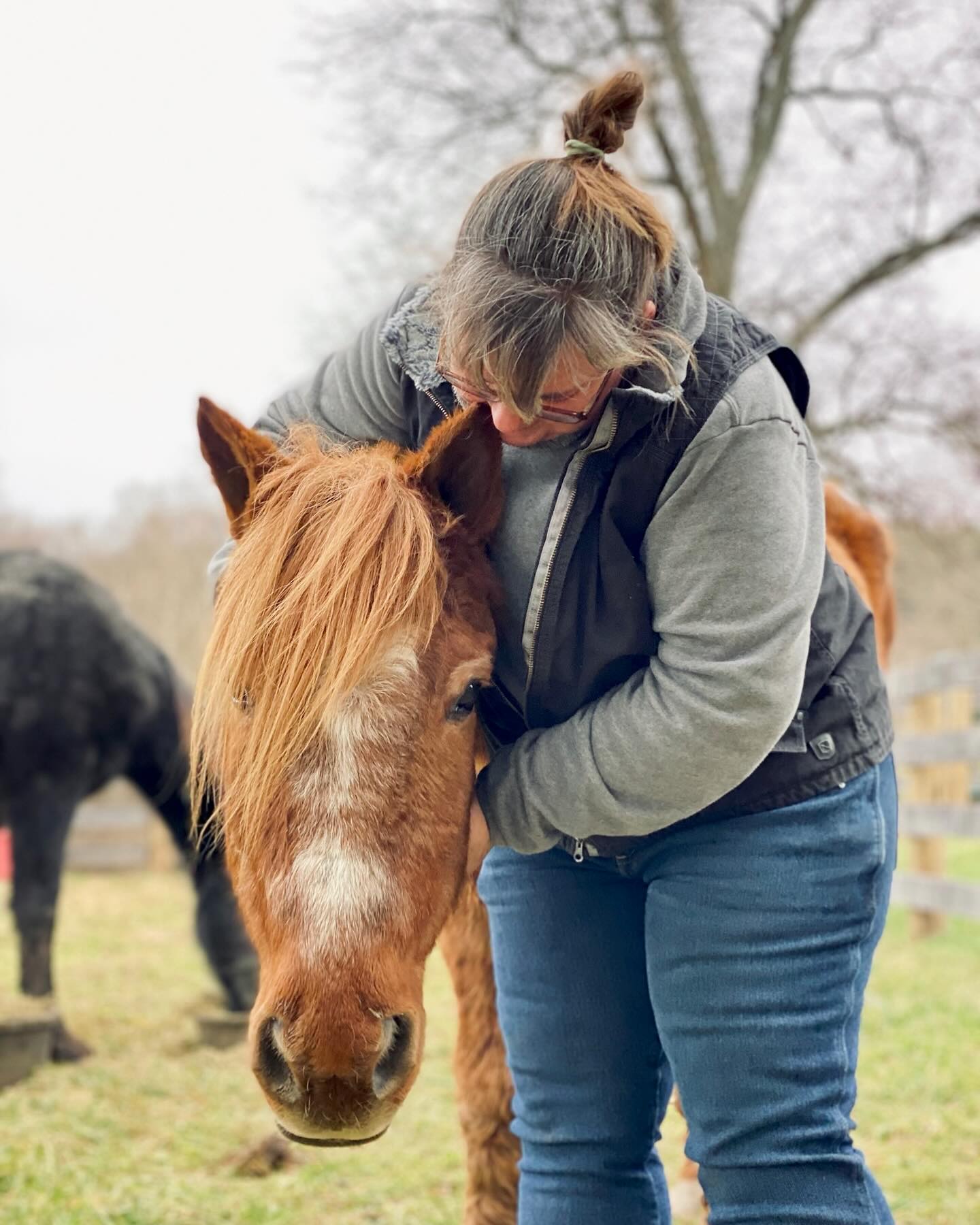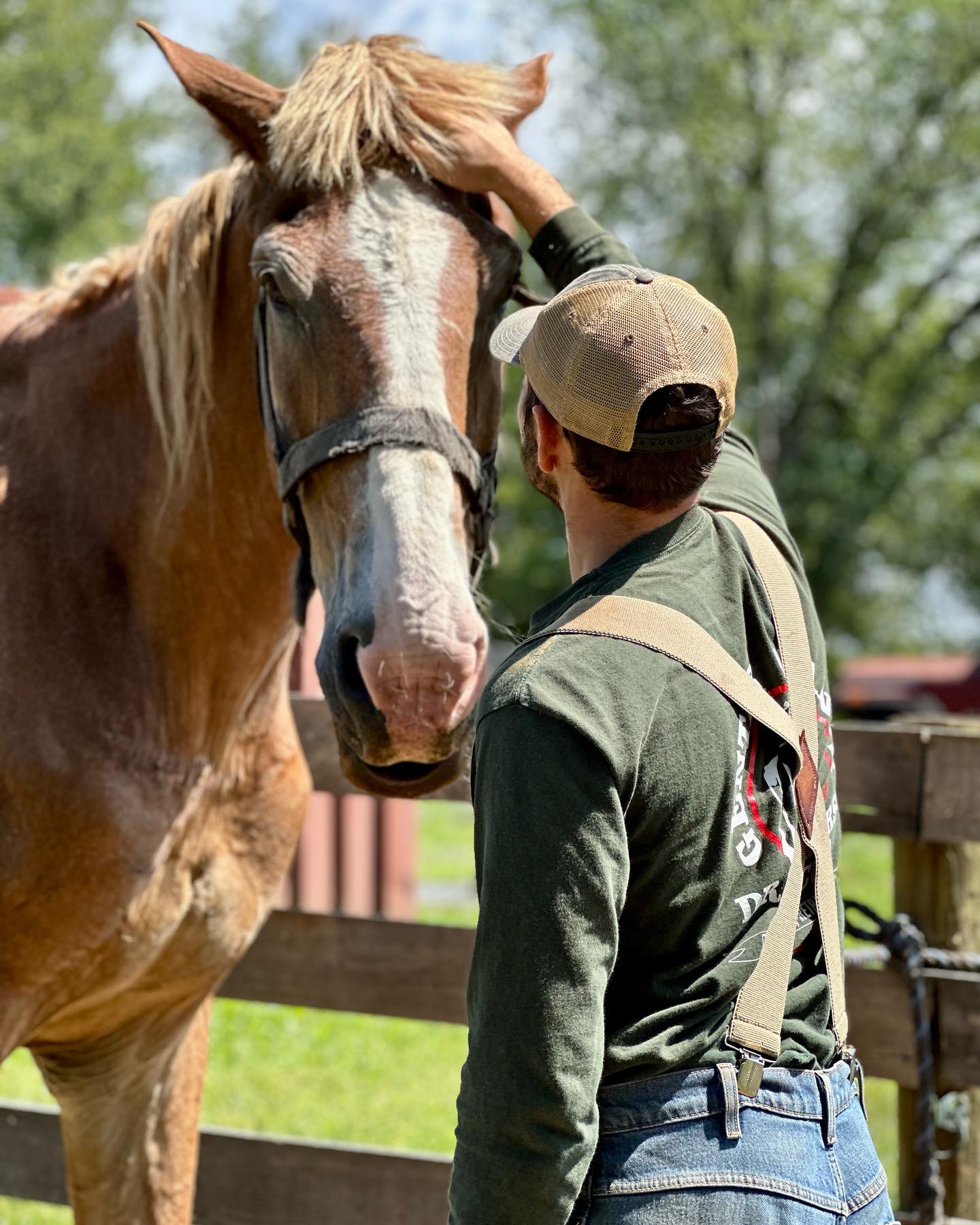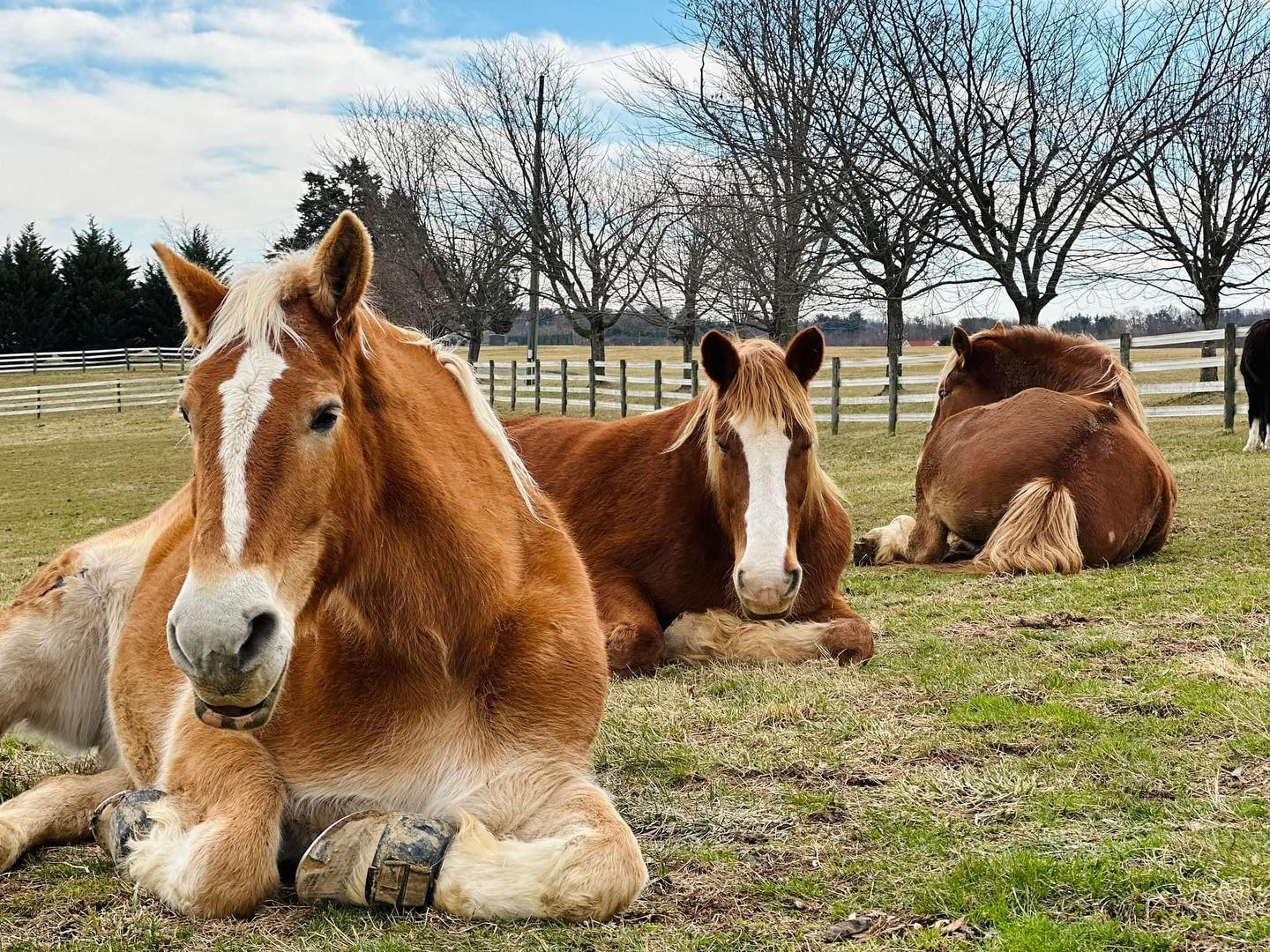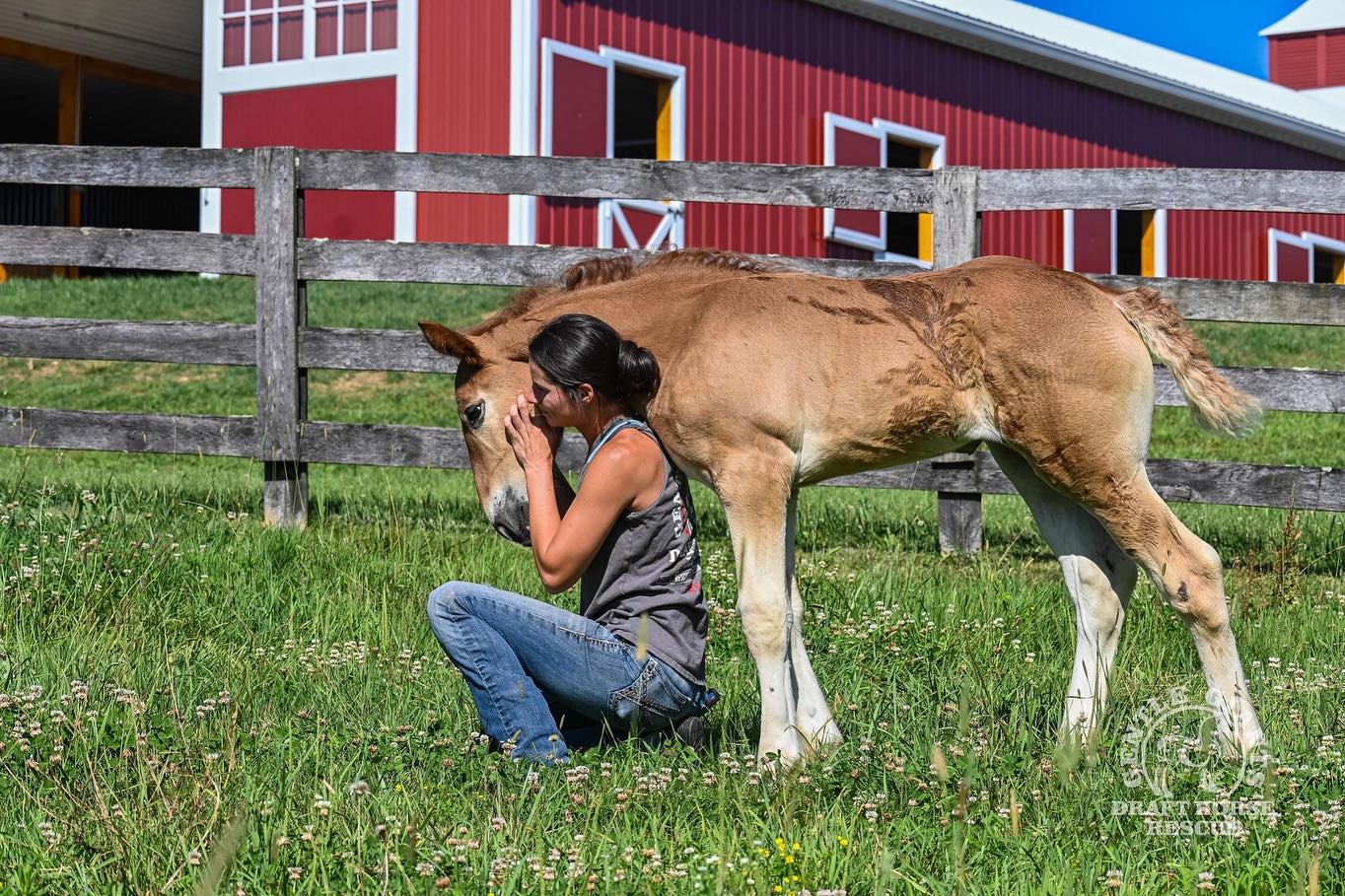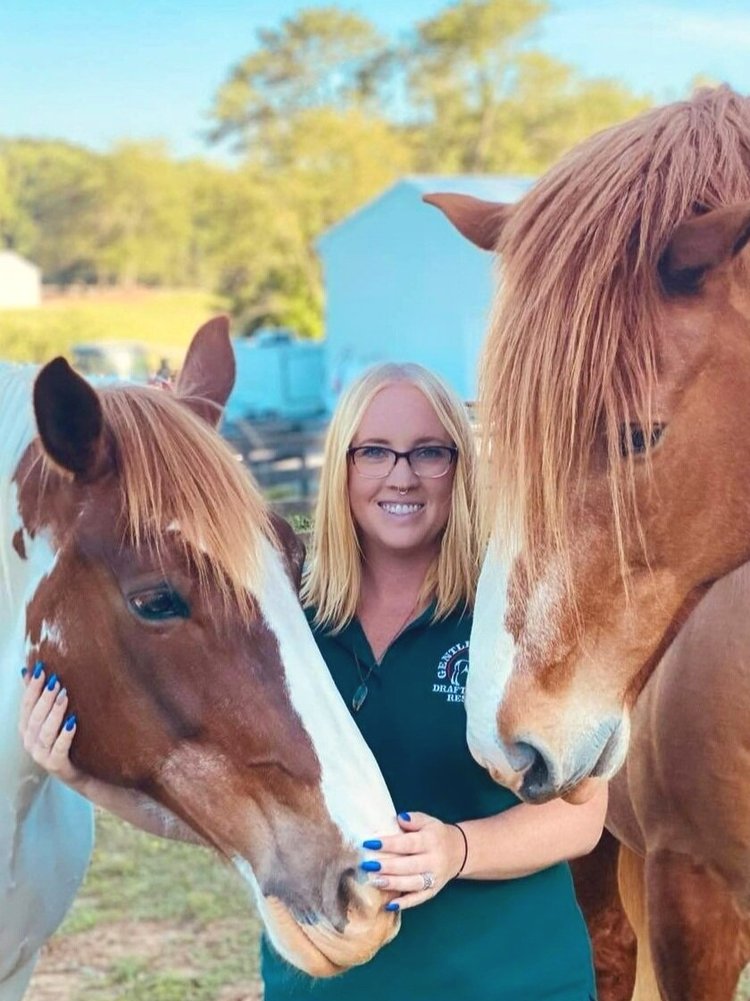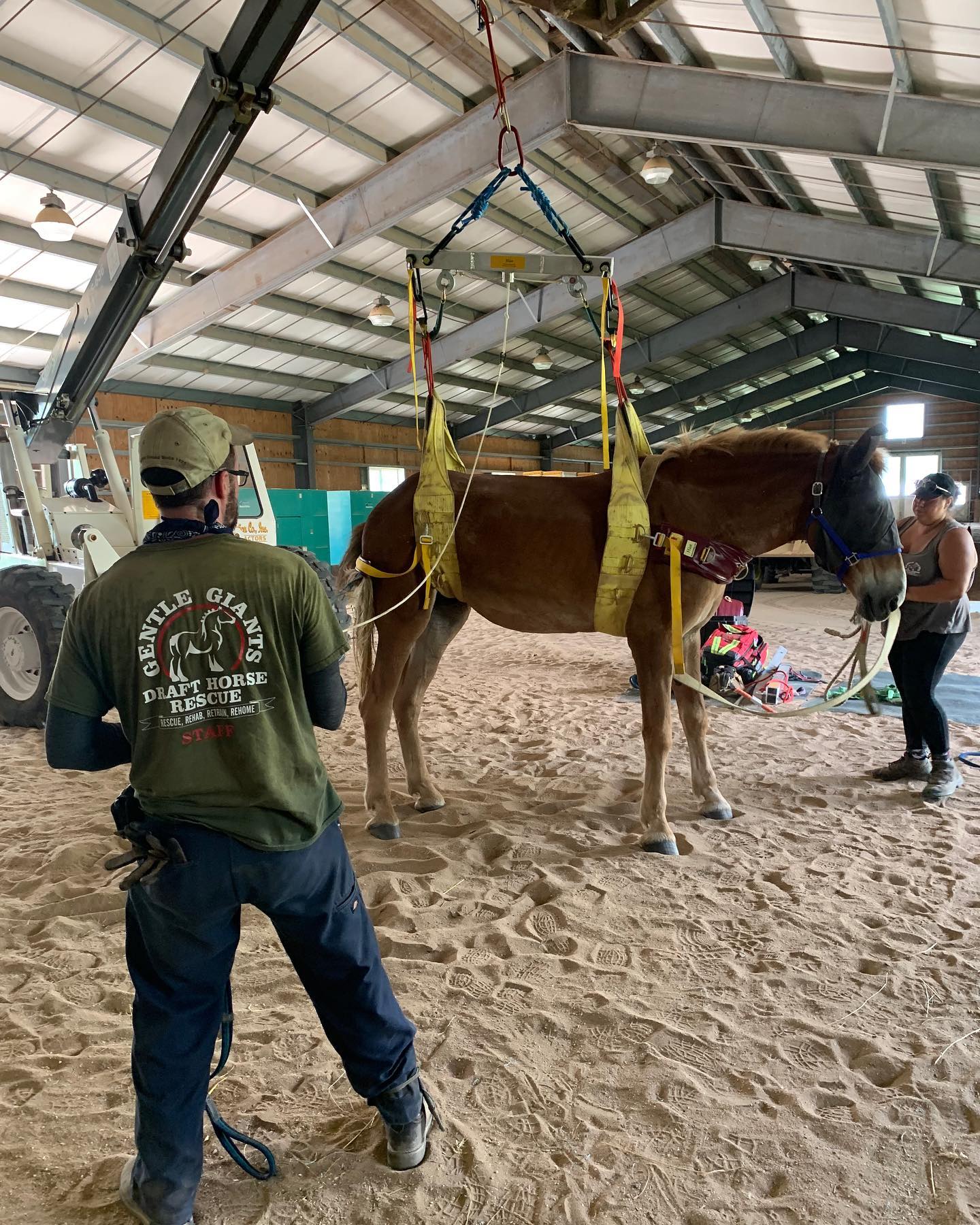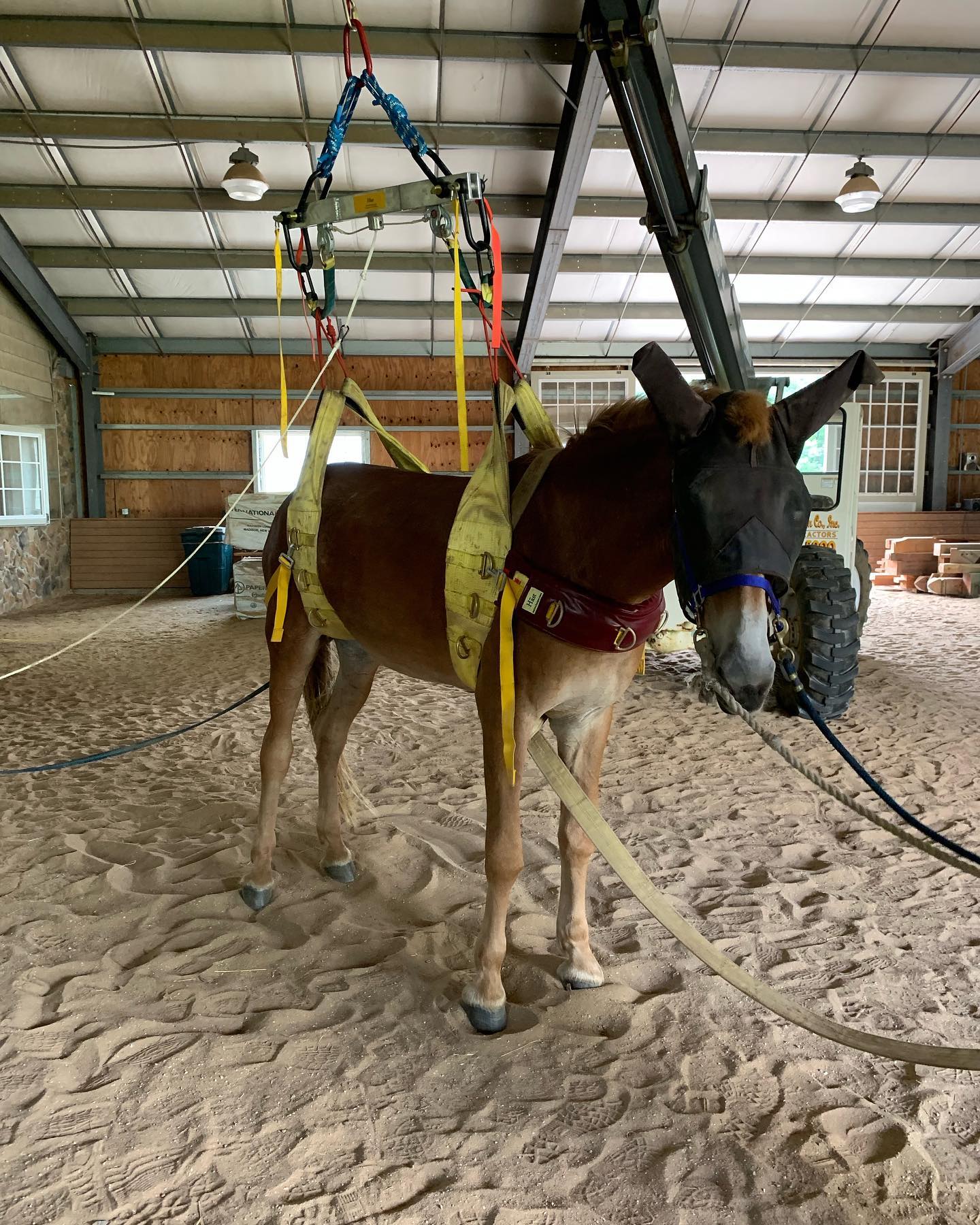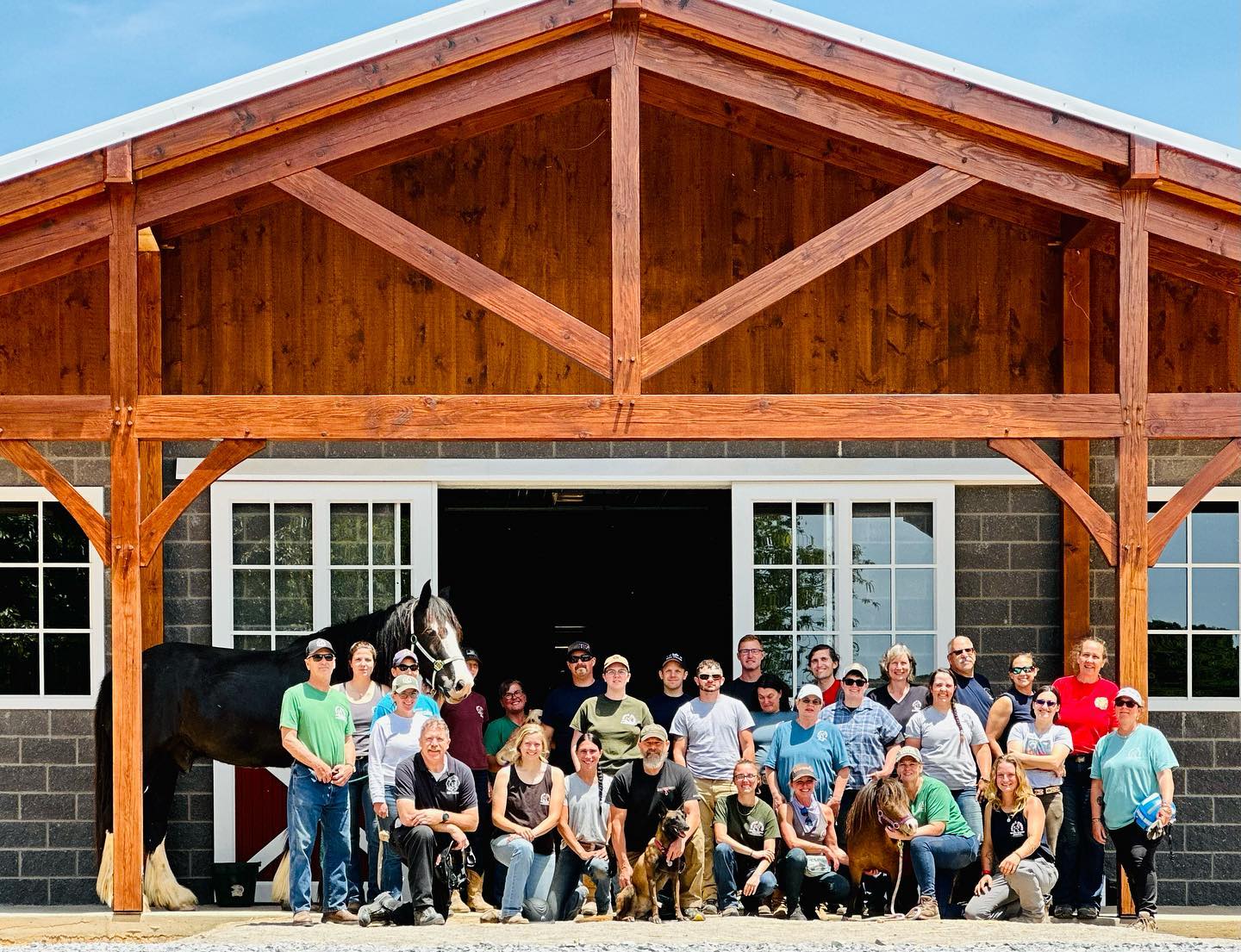“Do I hear fifty dollars? Fifty, do I hear fifty dollars for the quarter horse? I hear sixty, now 70, 80, the competition’s getting tough here folks. Sold for $200, in a close contest between the gentleman in the black hat and the woman on the right.”
Based in the rolling hills of rural Mount Airy, Maryland, Gentle Giants Draft Horse Rescue provides shelter, rehabilitation, fostering and adoption to vulnerable draft horses. But that’s not all. Saddle up and hang on tight because this story is one fascinating, courageous and wild ride.
For Gentle Giants Draft Horse Rescue, rescuing horses reaches far beyond rehabilitating and rehoming older or injured draft horses. It’s a literal race for their lives, involving heroic (and often incognito) rescue operations to save these innocent and majestic creatures from unthinkable deaths.
The Start of an Unbridled Passion
It was 2005 and a young woman from the green acres of the Maryland countryside traveled to a local livestock auction in search of the perfect trail horse to guide her through the green pastures and meandering foothills of the Catoctin Mountains. A hearty Belgian draft horse caught the eye of Christine Hajek and she immediately started bidding for him, winning him for less than $100.
As she loaded him into her trailer, she overheard a Mennonite man sobbing nearby. Devastated, he divulged that he had to sell his aging horse and believed that the auctioneer sold it to a “kill buyer.” Christine assured him that he hadn’t.
Mortified, she learned that “kill buyers” frequented local auctions in pursuit of horses to send to slaughter for human consumption via overseas meat companies. Christine immediately took the draft horse home and started Gentle Giants Draft Horse Rescue.
Healing Hands for Gentle Giants
“Christine thought Gentle Giants was really big when they had eight horses,” shares Lorin Grey, Development Director (and primary storyteller) for Gentle Giants. Almost 20 years later, Gentle Giants has rescued nearly 2,000 draft horses.
With a mission to “rescue, rehabilitate, retrain and rehome” these graceful horses, Gentle Giants Draft Horse Rescue currently houses and assists over 150 horses at a time (182 at present) on their 320-acre farm, bringing over 300 horses to safety a year. The property includes multiple stables, full equine medical facilities, an advanced “27-stall healing barn with x-ray, ultrasound and endoscopy equipment, a draft horse-size scale for weighing horses, operating capacity to conduct surgeries and more,” Lorin shares.
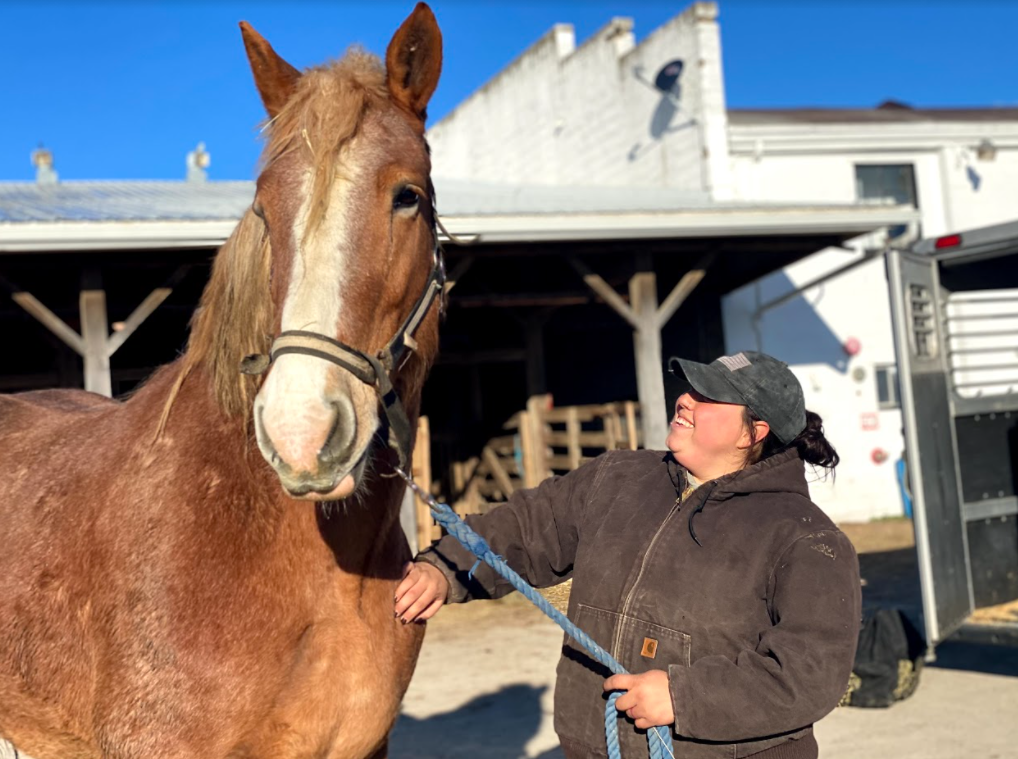
Rescue
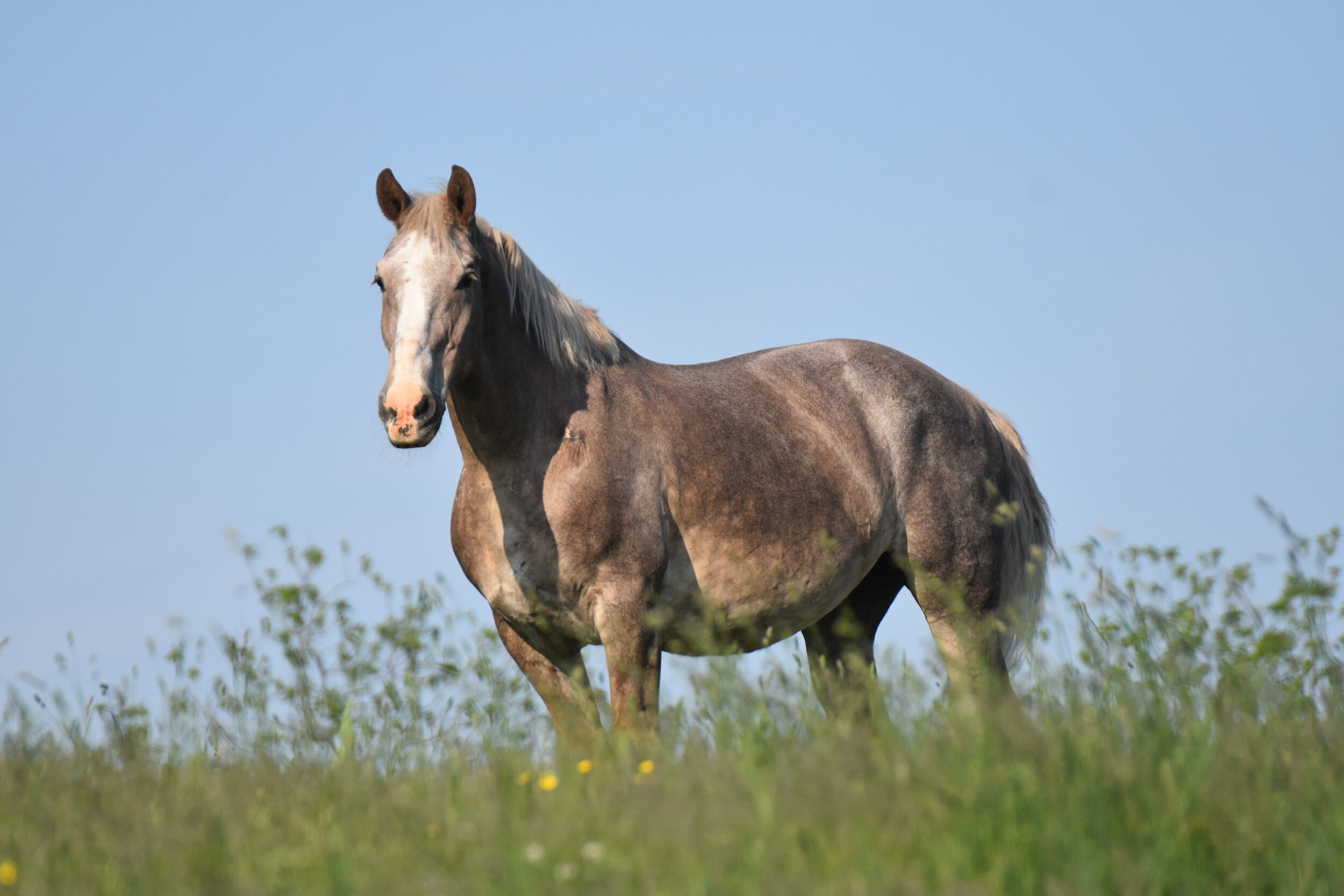
Rehabilitate
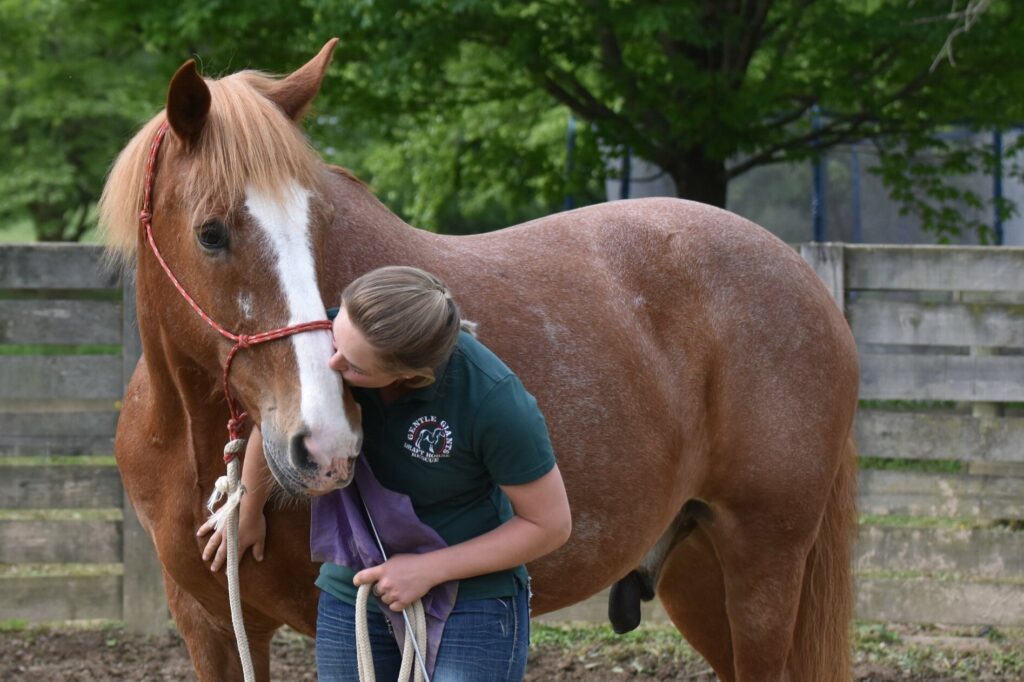
Retrain
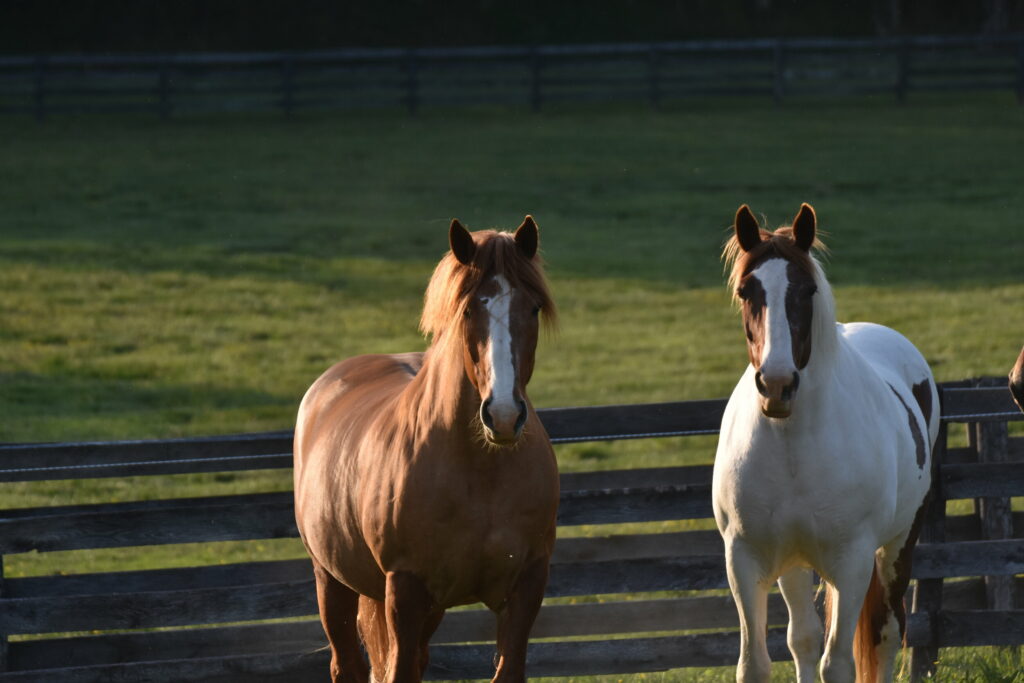
Rehome
Additionally, Gentle Giants facilitates much needed dental assistance for the horses. Besides providing general dental care the horse may need, equine dentists can identify what type of hay a horse may require (some types of hay may cause choking).
“Obviously they see a farrier to make sure that their hooves are healthy. They’re assessed from nose to tail, and then we come up with a customized treatment and nutrition plan for every single horse. Over half of the thirty-person staff team at Gentle Giants spends dedicated time with the horses daily so they can catch anything the horses may need,” Lorin says.
Uncovering a Dark Industry
Gentle Giants is in close proximity to many Amish and Mennonite communities in the Northeastern U.S., where draft horses remain essential contributors, assisting with transportation, plowing and other agricultural practices.
Ideal for working farms, draft horses (which include the legendary and stunning Clydesdale breed) typically interact well with humans and other animals, while their muscular and durable builds make them capable of assisting with the heavy lifting and towing common in farm life. “Draft horses also make wonderful trail riding horses,” mentions Lorin, and “a huge number of people want a draft horse for trail riding.”
Unfortunately, when injured or aging-out of their prime years, the draft horses are typically sent to livestock auctions and sold for very little. “Occasionally a horse is in such severe condition that it is sold for only ten dollars. Very rarely, a bid can go up to a thousand. Regional auctions are held regularly in locations where draft horses are common,” Lorin explains.
“Fit and able horses can cost several thousand dollars. Older draft horses, typically over age twenty, sell for only a few hundred dollars, tragically making them ideal targets for buyers for foreign meat industries. Kill buyers get paid per pound. So the bigger the horse, the bigger the paycheck,” explains Lorin.
The Humane Society confirms that “thousands of American horses are sent to slaughter every year and the vast majority would be rehomed; not every horse going to slaughter needs to go to rescue. The USDA documented that 92.3% of horses sent to slaughter are in good condition and are able to live out a productive life. These horses would be sold, donated or otherwise rehomed; however, kill buyers outbid legitimate horse owners and rescues at auctions, robbing horses of ever having a second chance at life.”
Heroes ‘Til Zero
Yes, we too were equally shocked to learn about the disturbing reality of these horses sold and shipped to slaughter on behalf of the international meat industry. But sit tight and hold your horses. Thanks to Gentle Giants, the story doesn’t end there.
Gentle Giants conducts sophisticated, stealthy and strategic operations to save these draft horses from the hands of meat industry intermediaries.
Since the foreign meat industry’s operatives fly mostly under the radar, Gentle Giants organizes teams of volunteers who discreetly attend local auctions and outbid potential kill buyers. Gentle Giants takes this approach in order to spare the lives of these horses and also to avoid any “exchange of money from ever crossing the hands of the kill buyers themselves,” explains Lorin.
“We attend the same public auctions and outbid the meat buyer. We believe this is the best way to stop the flow of profits into the slaughter system as our donors’ money goes directly to purchasing the horse and no money goes into the hands of a meat buyer or horse broker.”
The skillfully trained and covert volunteers arrive like any other buyer. “There are no logos or identifying markers on trucks and trailers. We maintain a low profile. Kill buyers will intentionally outbid if they know they’re competing with a horse rescue effort.” Bidding is extremely fast-paced and intense, when the volunteer buyers return with a rescued horse, the Gentle Giants team and medical staff is waiting to welcome them.
New Year, New Life
At the end of each year, Gentle Giants conducts its most ambitious rescue campaign. “New Year, New Life” aims to “fill every single trailer, it’s the final rescue mission at the end of year auction, and that’s the one that the kill buyers typically target as their last shipment or last paycheck for the year. Everyone’s at home with their family celebrating the holidays, so the kill buyers think they will have little competition.”
This last December 29th, 2023 the “New Year, New Life” operation brought home 32 horses on seven different trucks and trailers, crossing state lines from Pennsylvania to Maryland.
“A lot of people may drive by a farm and see some horses plowing a field. And they may not know that next week, those horses may be shipped abroad to be slaughtered for human consumption, which is wild that this is still happening. And thankfully, the slaughterhouses in the US are sort of shut down. But our horses are still being exported. And the numbers are significantly decreasing year over year, but until it’s zero, we’re not gonna stop,” Lorin reiterates.
Sending in the Cavalry
While Gentle Giants valiantly works to protect draft horses from slaughter, abuse and neglect, they also accept horses from owners in-crisis who may urgently need to rehome a horse. In these extenuating circumstances, the owner has done everything possible to spare the horse and surrendering the horse is truly a last resort.
“We want to promote responsible ownership and having a plan for their horse. These horses tend to have a health issue that’s too expensive or highly intensive.” Because of the logistics and costs of transporting horses, Gentle Giants tries to only accept horses from within a 5-6 hour radius of their Mount Airy location. When they receive an out-of-state request, they first try to network with other horse rescue organizations to accept the horse. In very rare cases they will hire a “bougie trailer that makes extra stops and keeps the horse comfortable,” Lorin says.
Green Pastures for Golden Years
While adoption fees are very low, Gentle Giants upholds stringent requirements to qualify applicants to adopt one of their rescued horses. Draft horses can live up to thirty years, and most horses are about twenty years old when rescued or retired. To assure the horse’s continued safety and well-being, horses can only be rehomed within a 4-6 hour radius of Gentle Giants’ Mount Airy location.
While rehoming a horse is a primary objective for Gentle Giants, not all horses can be adopted. Many horses reside on-site at the Gentle Giants farm for the remainder of their lives, requiring specialized, long-term medical care and daily assistance.
“Our Sanctuary horses are wise, old souls, a lot of them have physical scars from their working days,” shares Lorin. Besides sometimes needing resocialization, “many aren’t eligible for adoption because the burden of care might be too much for a potential owner. So they live the rest of their days on our Sanctuary, happily fed and cared for by staff and volunteers.”
Gentle Giants also offers a hospice foster program, for individuals who are willing to take on a horse at the end of its life. The horse may have as little as a few months to several years left to live, and the special and caring hosts of these fosters provide a loving environment for the horse to spend the remainder of its life.
Keeping Things Stable
Because these horses are typically sold at auction for just a few hundred dollars, Gentle Giants’ fundraising helps cover the cost of buying these horses from auction. Their unique sponsorship model covers the monthly costs of boarding, feeding and caring for the horse.
“A horse is sponsored by just a few individuals and rehabilitated so that it can also find a new forever home with a nearby adopted family. A horse is fully sponsored once it reaches the amount it needs (about $300 a month). Sponsors receive photos and videos of the horse and the opportunity for an up-close connection with the horse. Gentle Giants stays in touch with the sponsors until the horse is adopted.”
Besides the dedicated staff at Gentle Giants, a small army of about 200 volunteers with varying schedules help keep this formidable operation running. Many volunteers are retirees, the eldest approaching 90 years old. Lorin shares that she too started as a volunteer just five years ago because, like so many volunteers, she “needed to be around animals and just needed to hug a horse. I came out to volunteer, and never left,” she says.
Since then, Lorin has adopted three horses and fostered two, with little prior experience or background with horses. When Gentle Giants offered her an official position on staff three years ago, as much as she appreciated her previous job, she jumped. She couldn’t miss the opportunity to apply her skills to serving an organization that “had changed not only these horses’ lives, but her life and so many others.”
From One Barn to Another
So how exactly does such an extraordinary rescue operation use NumberBarn? It be-hooved us to find out!
Gentle Giants utilizes several easy-to-remember vanity phone numbers, like (84)HORSE911 as emergency hotlines, which mobilize their Technical Large Animal Rescue team, or TLAR team. This on-call, expert team immediately deploys to lift an injured or trapped large animal, such as a horse or cow.
“The team will go help these animals with their owners, sometimes in the rain, in the middle of the night with a specifically-designed lift for animals up to the size of an elephant,” Lorin explains. “It takes 6-8 people to hold the animal and the specialized equipment.”
Many times these are “private owners whose horse perhaps got stuck in mud and can’t get up, other times our TLAR team has to assist with a recovery operation,” she shares. A vet is also present to assist with any sedation, pain medications, etc. required to stabilize the animal before the team and equipment do the heavy lifting.
Wow! We’re elated to learn how these custom phone numbers contribute to such unique and life-saving endeavors.
Thank you Gentle Giants for your impressive (and intriguing) work protecting the lives of these breathtaking beauties. We hope that your efforts continue to make great strides in supporting these precious animals.
Do you need an additional phone number for your business? Consider taking the reins and helping your brand stand out with a memorable custom phone number, coupled with convenient features like call forwarding, auto-attendant menus, text and more, at NumberBarn!
